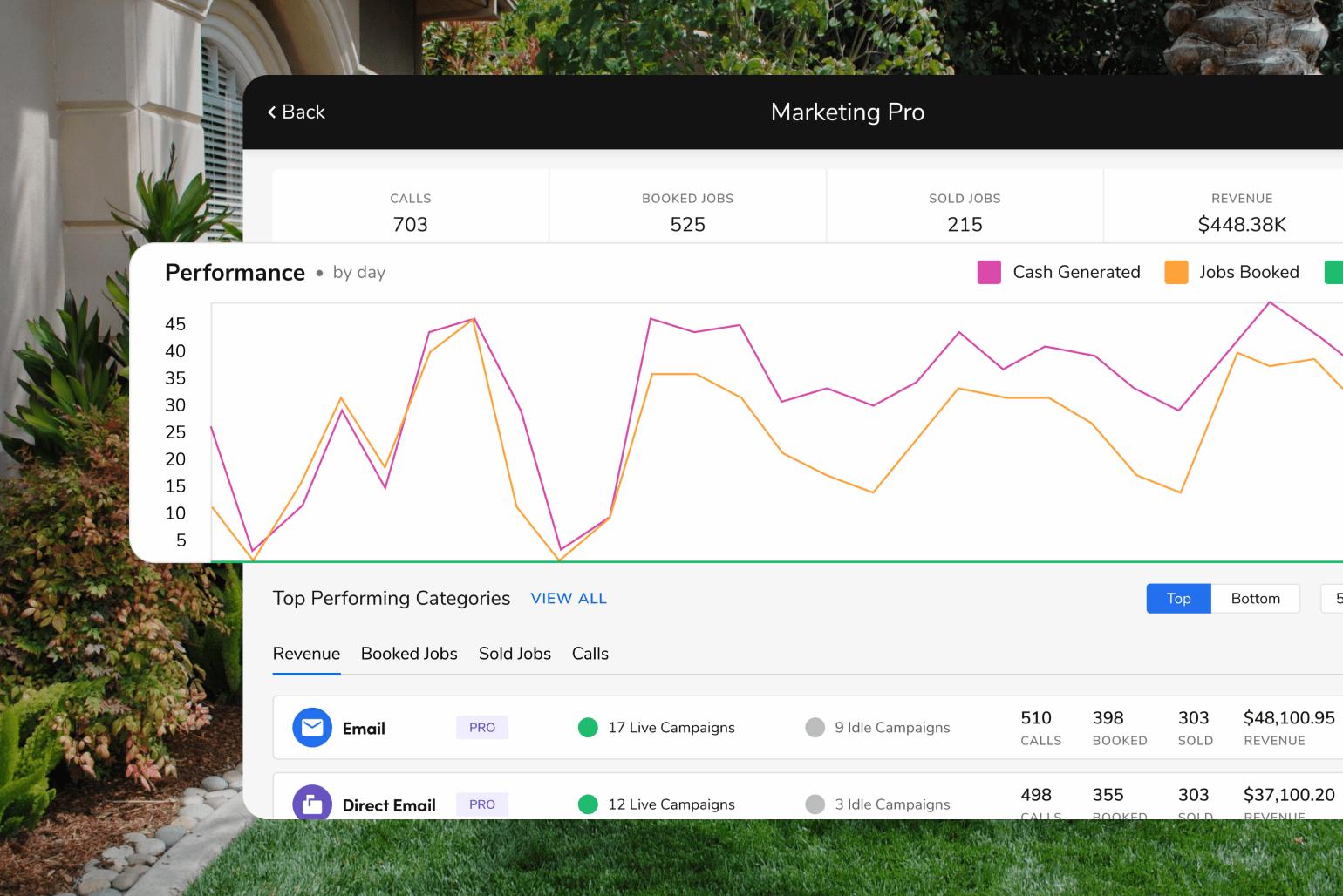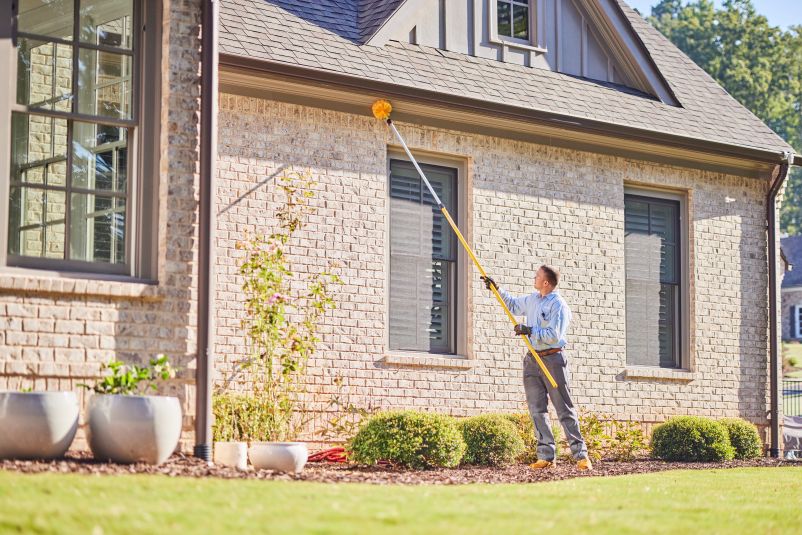How To Add Pest Control Services to Your Lawn Care Business (Boost Revenue)

As a lawn care business owner, you’re always looking for strategies to generate additional revenue. One proven method for profitable business growth is adding pest control services to your lawn care business.
Expanding into pest control allows lawn care companies to offer new services to existing customers while at the same time attracting new ones to grow their customer base.
Before taking action, business owners need to evaluate the market and develop an effective plan. This how-to guide shares the steps to develop, integrate, and deliver quality pest control services in your existing lawn care or landscaping business.
Step 1: Assess the Market Demand
Experts predict the pest control industry is on the upswing. In the Pest Management Professional’s 2024 State of the Industry Survey, the majority of respondents said they were “extremely optimistic” about the industry, compared to a “slightly optimistic” viewpoint in 2023.
But before you expand your business, first assess market demand. This includes researching the need for pest control services in your area. Here’s how to do it.
Perform a customer analysis
Research your potential customers' demographics, needs, values, and behaviors. This could include industry research, feedback from your current customers, or social media surveys.
Segment potential customers based on similar characteristics. It helps create a fictional profile of your ideal client so you can develop services and service packages at the right price.
Evaluate competitor offerings
Analyze pest control companies in your area to position and promote your businesses competitively. Evaluate competitors’ services, marketing, and prices.
Find ways to stand out. Is there a pest control service or method not offered in your area? Could you bundle lawn and pest services to save customers time and money? Identify methods to price and market services to gain a competitive edge.
Step 2: Integrate Pest Control Into Existing Business Operations
Adding pest control to an existing business is advantageous because you’ve already established a business structure and operational procedures. Even though it’s not a startup, there’s still preliminary work to perform.
You’ll need to check state and local regulations for pest control business licenses or permitting requirements and possible increases to business insurance. Below, find out how to integrate pest control services into your lawn care business.
Assessing Compatibility with Current Services
Ensure pest control services fit with your company’s current services. If your company provides lawn maintenance services, offering tick, flea, and mosquito control or other solutions for pest problems may make sense.
You’ll also need to consider changing your business name to encompass your new services. Evaluate how the change will affect your brand, including your logo, website, business cards, and vehicle wraps. Update your business plan to reflect your advancing business goals.
Required Equipment and Resources
Pest control management and extermination requires specific tools and equipment, which means additional expenses.
Identify required equipment and products, such as:
Personal protective equipment, such as respirators, goggles, and gloves
Chemical sprayers and hoses
Pesticides
Foamers
Dusters
Baiting systems
Research funding options for new business expansion include business loans, equipment loans, a line of credit, or other investment options.
Training and Certification Requirements for Employees
When expanding into pest control, your business will likely need to hire technicians or train current employees.
The U.S. Environmental Protection Agency requires pest control companies to possess one certified, licensed commercial pesticide applicator in the proper service category. Other applicators under their supervision also must possess licensing or certification.
The Department of Agriculture in each state oversees pest control licensing and certification. Requirements typically include work experience, passing an exam, and completing required paperwork. Check your state and local regulations to remain in compliance with licensing.
To enhance service quality, consider providing continuing education, professional memberships, or additional certifications.
Step 3: Develop New Service Offerings
You’ve already developed a mix of lawn care services, so now it’s time to do the same for pest control. Find out how to offer the best pest control services and set the right price to grow your business.
Types of Pest Control Services to Consider
Your market analysis should tell you the services customers need in your area. The types of services you offer depend on your business goals.
Pest control services could include:
Commercial or residential: Commercial pest control services are provided to commercial properties, such as businesses and large facilities. Residential pest control helps homeowners eradicate or manage pests in their homes.
Exterior only: Offer services for a property’s exterior, such as treating outdoor areas and a building’s perimeter.
Exterior and interior: Provide complete exterior and interior services, including termite, cockroach, and bed bug infestations.
Pest control companies typically use a range of effective pest control methods, such as:
Physical control: Seal spaces, set traps, and suction out bugs.
Chemical control: Use pesticides to target specific pests.
Biological control: Manage pests using other living organisms or reinforcing biological mechanisms.
Find a niche to offer specialized services, methods, or products to set your company apart.
Pricing Strategies and Packages
Pricing directly impacts your profitability and long-term growth. To determine the right pest control prices and profit margin, factor in the cost of labor, equipment, and overhead expenses.
Consider pest control packages for quarterly, bi-monthly, or annual service. Offer packages for commonly used services, such as general pest control plus termite protection. Customers may opt for a package instead of a one-time service if they receive a discounted price and understand the value of ongoing service.
Bundling Options with Lawn Care Services
Lawn care businesses adding pest control gain an advantage with the ability to bundle lawn care and pest control services together. Packages save the customer time and hassle of scheduling maintenance services and establish a loyal customer base.
Bundling options could include:
Monthly lawn maintenance and quarterly perimeter pest control
Monthly lawn maintenance, quarterly perimeter, and quarterly interior pest control
Monthly lawn maintenance, quarterly perimeter, and annual interior pest control
Monthly lawn maintenance and annual interior pest control
Identify the most popular services and offer attractive packages to save your customers time and money.
Step 4: Promote the New Services
Marketing campaigns advertise your new services to current customers and attract new customers to your small business.
Develop a marketing plan to outline your goals, budget, strategies, and methods to measure performance. The most effective marketing strategies use omnichannel for a consistent message and customer experience.
To generate more leads and conversions, consider the following strategies:
Local SEO: Use search engine optimization to help your website and online content rank higher in online searches. This helps potential customers find your business when they search online for lawn and pest control services.
Social media: Post eye-catching content on your social media channels. Use high-quality images, videos, and humor to engage your audience.
Email marketing: Send targeted emails to send timely messages to the right customer. Use email templates to follow up on estimates and contract renewals or offer discounts.
Networking: Attend in-person networking events with local business organizations. Consider how to advertise your services to business professionals in other industries, such as real estate agents or property managers.
Direct mail: Mail postcards or use door hangers to advertise your services in a specific area.
Simplify your marketing with lawn and pest control software. FieldRoutes® Software provides fully integrated tools through ServiceTitan Marketing Pro to automate marketing campaigns.
Step 5: Implement Quality Control Measures
Quality control helps your business grow. Train employees and develop operational standards to ensure your team delivers consistent, quality service.
This could include creating workflows for specific tasks and utilizing site checklists and inspections.
With the FieldRoutes mobile app, lawn and pest control technicians arrive at every job prepared with routing details, customer information, and appointment notes. FieldRoutes provides specific pest control tools to streamline wood-destroying organisms (WDO) inspection and reporting, including licensed access to NPMA-33.
Measure quality control through customer feedback, such as surveys or questionnaires. Improving quality control increases customer satisfaction, positive online reviews, and word-of-mouth referrals.
Level Up Your Business with the Right Technology
Adding pest control services to grow your lawn care business involves strategic planning.
FieldRoutes lawn and pest control software helps your business operate more profitably by automating field service operations, including scheduling, routing, crew and customer management, invoicing, and payments.
FieldRoutes provides easy-to-use tools for analyzing real-time business performance, empowering you to make proactive, profitable decisions about scaling.
Ready to optimize business growth? Schedule a demo to find out how.





